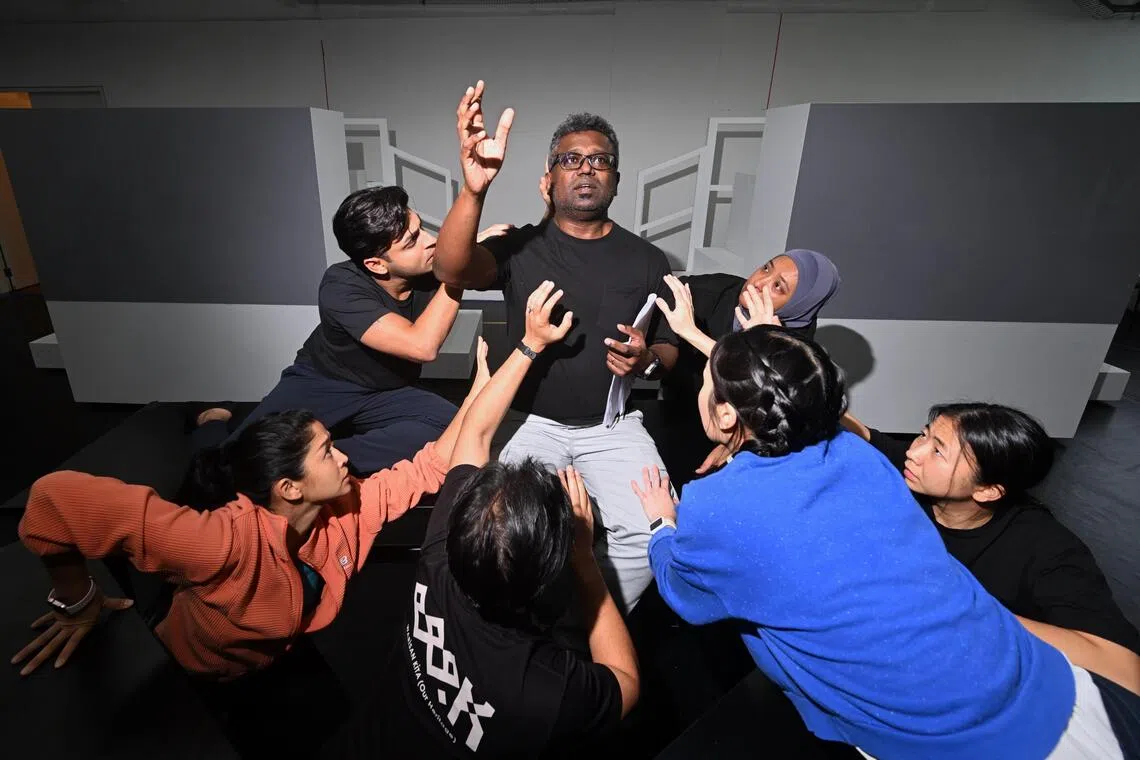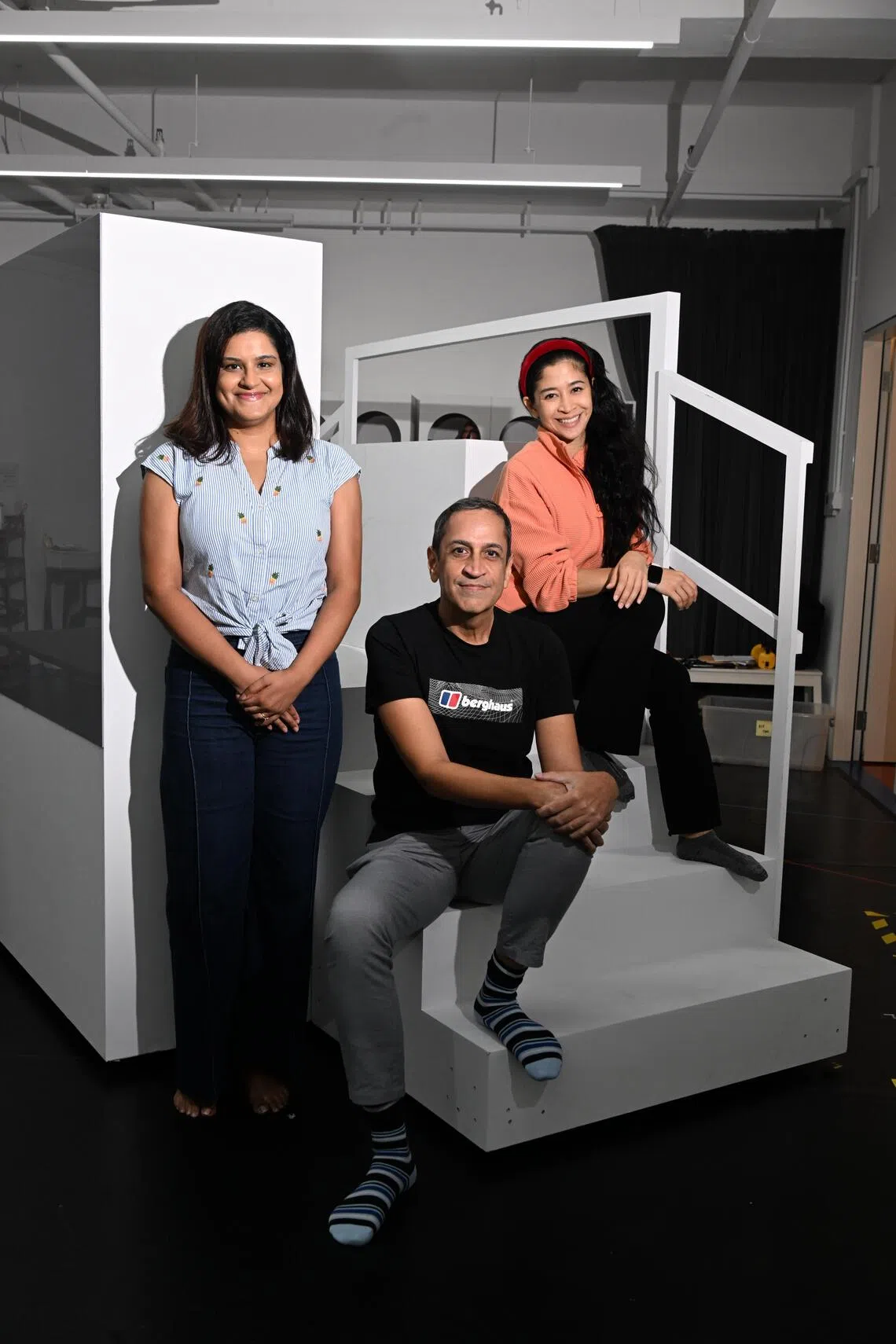The Necessary Stage’s SG Insecure parodies surveillance state through task force and Merlion
Sign up now: Get ST's newsletters delivered to your inbox

Directed by Haresh Sharma, SG Insecure, seen here during a rehearsal on Oct 10, aims to provide thought-provoking critique and entertainment.
ST PHOTO: AZMI ATHNI
SINGAPORE – As a birthday gift to the nation on its 60th, The Necessary Stage’s (TNS) triptych play SG Insecure confronts nettling topics.
Homing in on the mistreatment of migrant workers and student activism, its overarching theme – played up in its marketing material – is that of surveillance.
Snatches of scenes this journalist catches at TNS’ rehearsal space in Paya Lebar Road includes a worm’s-eye view of the chaos of the 2013 Little India riot and the false security of a migrant worker boarding a lorry at the end of a hard day’s work.
But director Haresh Sharma insists the audience will not be bogged down by the weight of its themes. Come for thought-provoking critique, but also expect to be entertained.
He says: “This play is a parody. We are not talking about these things in a serious, serious way. Surveillance and all that is just within the world of the play.”
In fact, he has created further distance by linking the three short plays through the cheeky conceit of a government task force called SG Insecure, after SGSecure, the national movement to prepare the public for terror attacks and maintain social cohesion.
The original draft even had officers from the special branch come in to spoil proceedings – a hint at the tonal levity TNS is going for. It is propaganda made transparent and caricatured.
“This task force has commissioned the works and will be pushing its agenda of the SG Insecure app and Singapore being a smart nation, and how we must invest in artificial intelligence (AI),” he says, adding to the list of complaints the latest bugbear of the creative community for good measure.
Leavened with humour, the plays should still pack a punch. The playwrights for the three shorts are TNS associate artists A Yagnya, Sindhura Kalidas and Deonn Yang, the latter also doubling as assistant director.
Yagnya’s contribution follows the life of a rubber tapper, moving through time from the 1930s to present.
Kalidas has taken loose inspiration from the Fajar trial in 1954 – when students of a University of Malaya socialist club faced charges of sedition for publishing an article – and reimagined it for the present day.
Though her initial draft had been completed before more recent incidents of student activism, Kalidas still drew from these for her later versions.
In January, a memorial event in support of the Palestinian cause at the National University of Singapore saw over 100 pairs of shoes and a shroud placed in front of the Create research building, which houses a research alliance with the Hebrew University of Jerusalem. The police subsequently visited the homes of some participants to question them.
Kalidas, who is an educator, says: “We ask students to think critically in class and I find that it’s really difficult to get them to articulate what they are feeling and thinking. Maybe it’s partially fear, partially because our institutions are a bit too cautious.”
But young people today also seem a lot older. The extent of Kalidas’ activism when she was still a student stretched only as far as writing lifestyle pieces for the school paper. Stronger feelings were processed within the confines of her theatre practice.
“They have access through social media to the rest of the world in a way we did not.”

(From left) The Necessary Stage’s associate artist Sindhura Kalidas, playwright Haresh Sharma and actress Munah Bagharib.
ST PHOTO: AZMI ATHNI
Actress Munah Bagharib is the lead for Yang’s piece of the jigsaw, in the unexpected role of the Merlion. She is in search of a gold coin given out by then Prime Minister Lee Kuan Yew to those who helped with the decade-long clean-up of the Singapore River from 1977.
The actress says her TNS debut has led her to discover a sort of “emptiness” to the Merlion, a reliable guardian of Singapore’s city-scape who is generally disregarded by the local populace. “No one really asks her, ‘Hey, how are you? What do you want?’” she says. On this journey, she will have some help.
Haresh says SG Insecure also evolved to become an interesting study in the evolution of surveillance equipment over the past century, from the listening devices that came with a tinge of the thriller to the mundane ubiquity of closed-circuit cameras today.
Surprisingly, Haresh, Kalidas and Munah are relatively comfortable with the trade-off Singaporeans make for safety. Munah once instinctively asked to check CCTV footage when something happened to her overseas, only to feel incredulous when told there were no cameras.
Haresh says Singapore is particularly good at selling “benevolent surveillance”, not entirely unjustifiably: “It doesn’t have the same bad rap as in the past, where people are following you. It’s now for convenience, like our fingerprinting system and eye scans at the airport. We are so proud of it.”
Yet, Kalidas still perks up when she spots a new camera in the neighbourhood, which leads her to wonder what happened there to lead to its installation. Munah and Haresh chide Kalidas for not covering her laptop camera when she is not using it.
Technology has made it increasingly hard to keep track of which aspect of a person’s biodata is being retrieved, and narrowed the possibilities of saying no to the intrusion.
Haresh adds, with some horror: “The next generation will be even more used to it, with AI and deep fakes and everything. I have no idea what is going to come out of this whole thing.”
Book It/SG Insecure (R18)
Where: Practice Space, The Theatre Practice, 54 Waterloo Street str.sg/nqNi
When: Oct 29 to Nov 8, 8pm (Tuesdays to Fridays), 4.30 and 8pm (Saturdays), 3pm (Sundays)
Admission: $38 (SG Culture Pass eligible)
Info:



